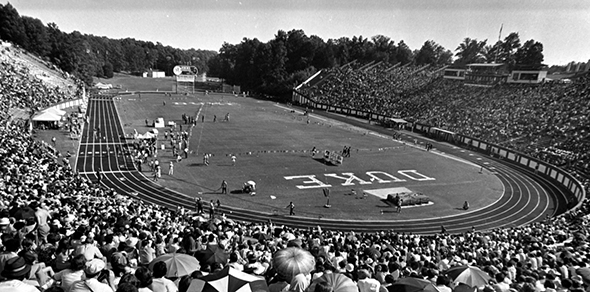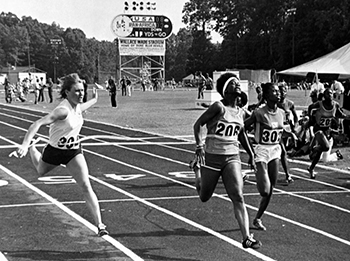Remembering Duke’s Historic 1971 Track Meet
This week marks the 45th anniversary of international campus event

When sports fans think of Duke history, memories may drift to Cameron Indoor Stadium, Mike Krzyzewski and Blue Devil basketball.
But this week marks an anniversary for an event that 45 years ago was seen as bigger than Duke, Durham and the country itself. On July 16 and 17, 1971, Duke hosted the Pan Africa-USA International Track Meet, hosting the largest such event in the Western Hemisphere that year and the first international track meet held in North Carolina and the Southeast. It pitted some of America’s best track and field athletes against competitors from 14 foreign nations.
An estimated 52,000 people packed Wallace Wade Stadium on two days that summer. Duke and Durham officials convinced the Amateur Athletic Union to come to the Bull City instead of accepting bids from New York City, Philadelphia, Detroit and Oakland. Until the Pan Africa event, the largest previous track crowd in North Carolina had consisted of 2,000 people.

“It’s a big deal, just from the standpoint of athletics,” Durham Herald-Sun staff writer David McKnight wrote in a July 11, 1971 editorial column leading up to the event. “But it comes at a time when Americans are awakening to the history, religion and literature of a continent whose cultures until recently have often been ignored in American schools and colleges.”
For McKnight and thousands of others, the meet represented an opportunity for cultures to collide in a myriad of positive ways. The effort to land the meet was led by LeRoy Walker, at the time the director of physical education and track coach at North Carolina Central University. Walker partnered with friend Al Buehler, the track coach at Duke, to secure space on campus.
Buehler, 85, recalled the effort as groundbreaking, putting Duke and Durham on the map for the ability to host a world-class meet.

“I managed the logistics, while LeRoy brought the best athletes to compete,” said Buehler, who retired last year from Duke after 60 years. “People from all over the country came to watch the top athletes compete like Steve Prefontaine. They wanted to be a part of history.”
Tickets to the event cost $1.50 for general admission and $2.50 for preferred seating sections, prices Walker and Buehler pushed for in order to make the event as affordable as possible for anyone who wanted to come. A $7,500 profit was donated to three charities, with UNICEF and Durham’s Recreation Department and John Avery’s Boys Club receiving a $2,500 each.
“The eventual winner of the meet is charity,” Walker told local press after the event.
Along with being a special occasion for Duke and Durham, the meet offered one of the most memorable moments in U.S. track history.

During the 5,000-meter race, Ethiopian distance runner Mirus Ifter gave American champion Steve Prefontaine fits, shifting between first and forth place as Prefontaine remained at the top of the pack. Then, with 300 yards left in the second-to-last lap, Ifter started sprinting. When Ifter crossed the startling line to mark the final lap of the race, he led Prefontaine by 40 yards.
“He threw up his hands in supposed victory and came to a stop, thinking the race was over,” wrote Sports Illustrated’s Peter Carry. “In the ensuing confusion, Prefontaine completed the final lap and won in 13:57.6.”
The race was one of many U.S. victories that propelled the men’s team to a 111-78 win while the U.S. women’s team also won, 79-53.
“The excitement the meet has generated, the friendships it has sealed and the international understanding it has promoted are all in the best American tradition and in the finest spirit of good sportsmanship,” President Richard Nixon wrote in a July 23 telegram to organizers, singling out Walker and Buehler for their efforts. “I commend you on the example you set, and I share your sense of accomplishment in an effort that has earned you the praise of all your fellow citizens.”